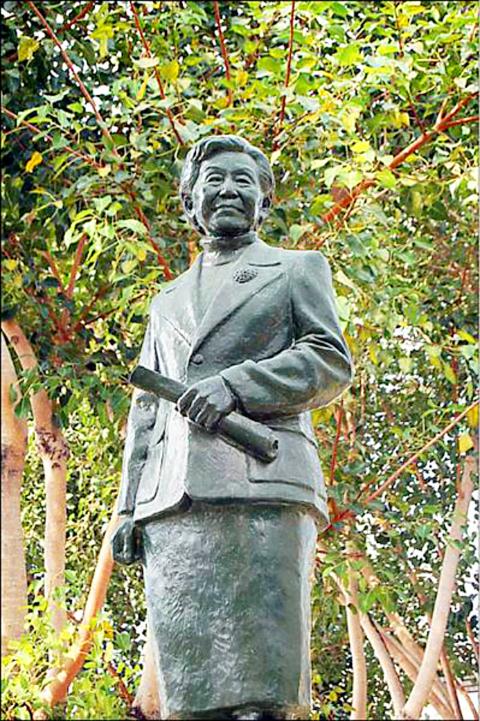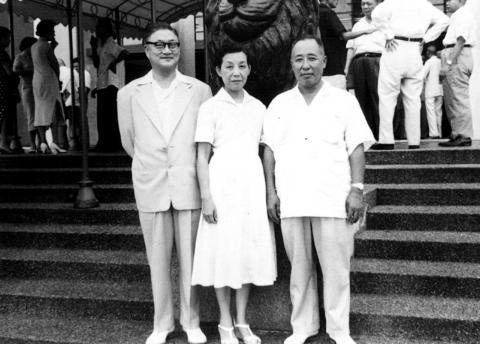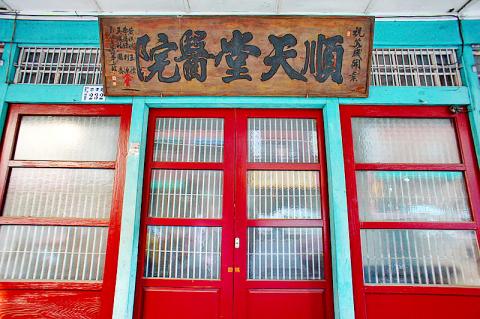June 25 to July 1
As a high school student, she confronted her Japanese principal over punishing another student who had been overheard speaking Hoklo (also known as Taiwanese) outside of school.
Decades later, Hsu Shih-hsien (許世賢) was fearlessly grilling Chinese Nationalist Party (KMT) officials as one of six Taiwan-born members of the Provincial Assembly.

Photo: Yu Hsueh-lan, Taipei Times
These six, called the “Five Dragons, One Phoenix,” were known for their firebrand questioning style and relentless pursuit of democracy and Taiwanese self-rule.
In 14 years with the assembly, Hsu proposed or co-proposed 335 motions and questioned various officials 154 times and was especially concerned about women’s rights such as adopted daughters and prostitutes.
Politics was not Hsu’s only strong suit. She also found success in medicine and education, blazing the trail for women as Taiwan’s first female doctor of medicine, high school principal, city councilor and mayor. She also founded Taiwan’s first post-war women’s association, served four consecutive terms in the provincial assembly and received the most votes in a legislative election.

Photo: Taipei Times file photo
At the end of it all, she had earned the moniker “The Matsu of Chiayi” (嘉義媽祖婆), a nickname bestowed upon individuals who dedicated their lives to helping others.
JOINING THE OPPOSITION
Born in 1908 under Japanese rule, Hsu was never shy to express her contempt toward the colonizers, reportedly getting in trouble in school for refusing to write a letter to Crown Prince Hirohito to commemorate his birthday.

Photo courtesy of WIkimedia Commons
She initially welcomed the KMT, and even toured the battlefields in China during the Chinese Civil War to boost army morale. But by early July of 1958, Hsu was one of 78 charter members of the the Chinese Local Autonomy Research Society (中國地方自治研究會), whose application was rejected by the government.
Her involvement led to her expulsion from the KMT, but in fact she had already broken ties with the party two years earlier over the suspension of then-Chiayi County Commissioner Lee Mao-sung (李茂松), who was accused of corruption.
When Hsu questioned the government — including why Lee was suspended before the court made its ruling — she was told that KMT members should not question such matters. That night, she mailed her party resignation letter and membership card to KMT headquarters, only to have it returned. This happened three times, and Hsu, fed up, ran as an independent candidate in the April 1957 Provincial Assembly elections.
Some of her talking points during this new term included adding native Taiwanese to the National Assembly, allowing people to study abroad, admitting women to the National Defense Medical Center’s doctorate program and popular elections for provincial governor to achieve democratic self-rule.
THE FAILED PARTY
The Five Dragons and One Phoenix were all reelected to office in 1960. Just a month into the new term, former KMT official Lei Chen (雷震) ran an editorial in his Free China (自由中國) magazine calling for a strong opposition party.
“Facing the KMT’s manipulation and dishonesty during elections, we need a strong opposition party to prepare for the next election to break the current situation of the KMT dominating the government. Without a healthy party system, there cannot be true democracy, and without a strong opposition party, there cannot be a healthy party system.”
The six assembly members were involved in the preparations in the ensuing months, leading to the formation of the China Democracy Party (中國民主黨) which included both China and Taiwan-born members. The plan lasted just a few months as the KMT arrested Lei and three others on Sept. 4, charging him with sedition and harboring communists.
Hsu avoided persecution and continued the fight, helping form in January 1961 an electioneering team for non-KMT candidates for the upcoming nationwide county and city council elections. She traveled Taiwan making passionate speeches, and this time the opposition shocked the establishment by winning 37.4 percent of available seats.
However, the KMT never relinquished their iron grip, using martial law and the Temporary Provisions Effective During the Period of National Mobilization for Suppression of the Communist Rebellion (動員戡亂時期臨時條款) to maintain political and social control.
After her fourth term in the assembly, Hsu was elected as mayor of Chiayi, her adopted hometown where she and her husband set up a hospital in 1940, winning the hearts of the city’s residents. But the KMT suddenly imposed an age limit of 60 for those running for local offices in an attempt to bar Hsu and other opposition heavyweights from politics.
But there was no stopping Hsu. She simply turned her focus toward the legislature, earning the most votes out of any candidate, and continued her outspoken ways. Once the age limit was lifted in 1982, Hsu ran for Chiayi mayor again, taking her last political post at the age of 74.
Hsu died a year later, but her daughters Chang Po-ya (張博雅) and Chang Wen-ying (張文英) carried on her legacy as Chiayi mayors. Chang Po-ya went on to hold many high-level government posts and currently serves as president of the Control Yuan.
Taiwan in Time, a column about Taiwan’s history that is published every Sunday, spotlights important or interesting events around the nation that have anniversaries this week.

US President Donald Trump may have hoped for an impromptu talk with his old friend Kim Jong-un during a recent trip to Asia, but analysts say the increasingly emboldened North Korean despot had few good reasons to join the photo-op. Trump sent repeated overtures to Kim during his barnstorming tour of Asia, saying he was “100 percent” open to a meeting and even bucking decades of US policy by conceding that North Korea was “sort of a nuclear power.” But Pyongyang kept mum on the invitation, instead firing off missiles and sending its foreign minister to Russia and Belarus, with whom it

Many people noticed the flood of pro-China propaganda across a number of venues in recent weeks that looks like a coordinated assault on US Taiwan policy. It does look like an effort intended to influence the US before the meeting between US President Donald Trump and Chinese dictator Xi Jinping (習近平) over the weekend. Jennifer Kavanagh’s piece in the New York Times in September appears to be the opening strike of the current campaign. She followed up last week in the Lowy Interpreter, blaming the US for causing the PRC to escalate in the Philippines and Taiwan, saying that as

When Taiwan was battered by storms this summer, the only crumb of comfort I could take was knowing that some advice I’d drafted several weeks earlier had been correct. Regarding the Southern Cross-Island Highway (南橫公路), a spectacular high-elevation route connecting Taiwan’s southwest with the country’s southeast, I’d written: “The precarious existence of this road cannot be overstated; those hoping to drive or ride all the way across should have a backup plan.” As this article was going to press, the middle section of the highway, between Meishankou (梅山口) in Kaohsiung and Siangyang (向陽) in Taitung County, was still closed to outsiders

The Chinese Communist Party (CCP) has a dystopian, radical and dangerous conception of itself. Few are aware of this very fundamental difference between how they view power and how the rest of the world does. Even those of us who have lived in China sometimes fall back into the trap of viewing it through the lens of the power relationships common throughout the rest of the world, instead of understanding the CCP as it conceives of itself. Broadly speaking, the concepts of the people, race, culture, civilization, nation, government and religion are separate, though often overlapping and intertwined. A government